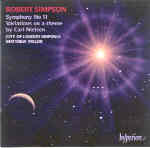It’s been a long time coming, but Hyperion concludes its series of Simpson symphonies triumphantly with this latest release. These recordings have been a true labor of love, for Simpson’s music never courts popularity, nor is it all equally good. He can be pedantic and austere to the point of dryness, but that’s never an issue here. In Symphony No. 11, Simpson justifies his use of a classical-sized orchestra by quite literally making every note count. In two movements, slow-fast, you can hear from the outset how he colors the string lines with wind timbres, always making sure that each entrance contributes to the evolving musical argument.
Though not conventionally tuneful, the music has recognizable themes, and it builds to a violent central climax very similar to what happens in the first movements of Shostakovich’s Fifth, Eighth, and Tenth Symphonies–though it takes only 13 minutes. The finale is light and fast and a couple minutes longer than the opening. Thematic material darts from section to section, generating a powerful amount of momentum before vanishing in a flicker. Again, the music is more about motion in time than it is about thematic development, but Simpson’s control of pace and texture ensures that the ear is constantly engaged.
Variations on a Theme by Carl Nielsen is a delight, plain and simple. Sure, the harmonic scheme gets increasingly gnarly as the work strays farther and farther from the theme, but Simpson both knows his Nielsen and understands exactly where he wants to go. Nine short and characterful variations precede a bold, 11-minute finale. The tune comes from Nielsen’s incidental music to the play Ebbe Skamulsen, written around the same time as the Sixth Symphony (there’s at least one recording, on Kontrapunkt). It’s a wonderful choice: humorous and so instantly identifiable that whenever one of its elements reappears, you’ll have no problem catching it. The scoring is a bit richer than that of the symphony, with especially prominent percussion.
I have nothing but praise for these excellent, committed performances, in which every section of the City of London Sinfonia acquits itself with honor, and Matthew Taylor leads very sympathetic and confident interpretations. Having just encountered the music for the first time, I can’t honestly say whether it’s the music itself or the way Taylor & Co. play it that accounts for the unusually purposeful progress of both works, but Simpson seldom has sounded less dutiful. First class sonics put the icing on the cake, making the strongest possible case for Simpson as a composer whose works deserve to endure.
































